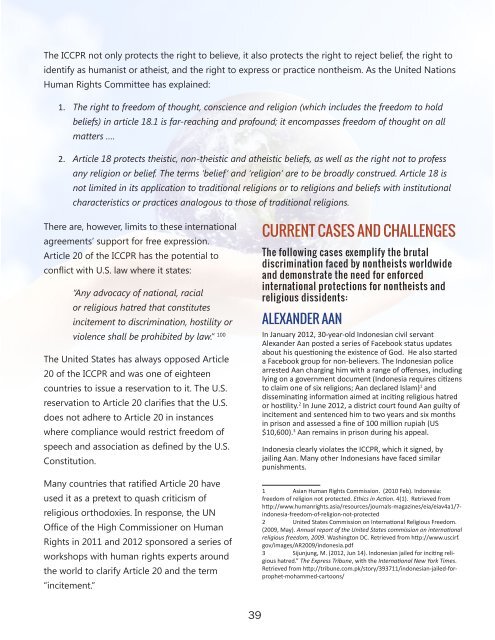Model Secular Policy Guide.pdf
Create successful ePaper yourself
Turn your PDF publications into a flip-book with our unique Google optimized e-Paper software.
The ICCPR not only protects the right to believe, it also protects the right to reject belief, the right toidentify as humanist or atheist, and the right to express or practice nontheism. As the United NationsHuman Rights Committee has explained:1. The right to freedom of thought, conscience and religion (which includes the freedom to holdbeliefs) in article 18.1 is far-reaching and profound; it encompasses freedom of thought on allmatters ….2. Article 18 protects theistic, non-theistic and atheistic beliefs, as well as the right not to professany religion or belief. The terms ‘belief’ and ‘religion’ are to be broadly construed. Article 18 isnot limited in its application to traditional religions or to religions and beliefs with institutionalcharacteristics or practices analogous to those of traditional religions.There are, however, limits to these internationalagreements’ support for free expression.Article 20 of the ICCPR has the potential toconflict with U.S. law where it states:“Any advocacy of national, racialor religious hatred that constitutesincitement to discrimination, hostility orviolence shall be prohibited by law.” 100The United States has always opposed Article20 of the ICCPR and was one of eighteencountries to issue a reservation to it. The U.S.reservation to Article 20 clarifies that the U.S.does not adhere to Article 20 in instanceswhere compliance would restrict freedom ofspeech and association as defined by the U.S.Constitution.Many countries that ratified Article 20 haveused it as a pretext to quash criticism ofreligious orthodoxies. In response, the UNOffice of the High Commissioner on HumanRights in 2011 and 2012 sponsored a series ofworkshops with human rights experts aroundthe world to clarify Article 20 and the term“incitement.”CURRENT CASES AND CHALLENGESThe following cases exemplify the brutaldiscrimination faced by nontheists worldwideand demonstrate the need for enforcedinternational protections for nontheists andreligious dissidents:ALEXANDER AANIn January 2012, 30-year-old Indonesian civil servantAlexander Aan posted a series of Facebook status updatesabout his questioning the existence of God. He also starteda Facebook group for non-believers. The Indonesian policearrested Aan charging him with a range of offenses, includinglying on a government document (Indonesia requires citizensto claim one of six religions; Aan declared Islam) 1 anddisseminating information aimed at inciting religious hatredor hostility. 2 In June 2012, a district court found Aan guilty ofincitement and sentenced him to two years and six monthsin prison and assessed a fine of 100 million rupiah (US$10,600). 3 Aan remains in prison during his appeal.Indonesia clearly violates the ICCPR, which it signed, byjailing Aan. Many other Indonesians have faced similarpunishments.1 Asian Human Rights Commission. (2010 Feb). Indonesia:freedom of religion not protected. Ethics in Action. 4(1). Retrieved fromhttp://www.humanrights.asia/resources/journals-magazines/eia/eiav4a1/7-indonesia-freedom-of-religion-not-protected2 United States Commission on International Religious Freedom.(2009, May). Annual report of the United States commission on internationalreligious freedom, 2009. Washington DC. Retrieved from http://www.uscirf.gov/images/AR2009/indonesia.<strong>pdf</strong>3 Sijunjung, M. (2012, Jun 14). Indonesian jailed for inciting religioushatred.” The Express Tribune, with the International New York Times.Retrieved from http://tribune.com.pk/story/393711/indonesian-jailed-forprophet-mohammed-cartoons/39


